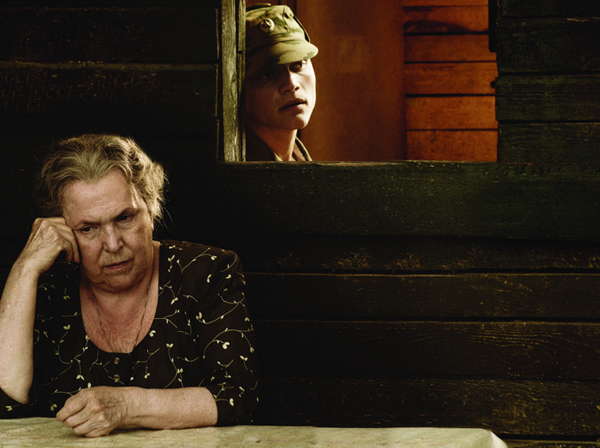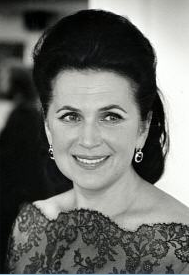Galina Vishnevskaya: Songs and Opera Arias
Galina Vishnevskaya
Songs and Opera Arias, with Mstislav Rostropovich, London Philarmonic Orchestra
EMI Classics. ASIN:B0000C18G7
The other day I was reading about this year’s Film Festival in Cannes, and about a Russian film by Alexander Sokurov. In the film “Alexandra”, a Russian grandmother goes on a visit to her grandson on military service in Chechnya, a visit which the director uses to discuss the impact of war on lives and character. The actress playing the grandmother is Galina Vishnevskaya……… Galina Vishnevskaya? Is that not the widow of Rostropovich,  a great operatic soprano? I clearly remember listening to her in a recital of Russian songs in Rio’s Municipal Theatre in the 1980s, accompanied on the piano by Rostropovich. A beautiful woman, full of dignity, with the most lovely voice, and a command of it that was astonishing. So many subtle differences of intonation and expression……. could it be the same person? I resolved to find out, and ended up more than ever impressed with her life and accomplishments.
a great operatic soprano? I clearly remember listening to her in a recital of Russian songs in Rio’s Municipal Theatre in the 1980s, accompanied on the piano by Rostropovich. A beautiful woman, full of dignity, with the most lovely voice, and a command of it that was astonishing. So many subtle differences of intonation and expression……. could it be the same person? I resolved to find out, and ended up more than ever impressed with her life and accomplishments.
A Russian Story
Galina Pavlovna Vishnevskaya was born in Leningrad in 1926, and in 1984 she published a book “Galina: A Russian Story” about her life up until 1974. This is told in direct style: “I don’t remember that I ever had any particular attachment to my parents: they were always alien to me. But then, they had cast me out when I was very young, only six weeks old, and my father’s mother had taken me in.” Galina was raised in absolute poverty by her grandmother; only her indomitable spirit enabled her to survive. She brushed with death several times: from starvation in the harsh winter that followed Hitler’s invasion of Estonia in 1941; at 18 from infection after childbirth, losing her son after only 10 weeks; from contracting tuberculosis four years later. But it was obvious from an early age that she had a remarkable voice. When the siege of Leningrad was relieved she studied at the Rimsky-Korsakov School of Music, beginning her career with the Leningrad District Operetta Theatre whose founder, Mark Rubin, became her second husband, when she was only eighteen. Following an audition for the Bolshoi Theatre in a youth competition she was accepted into the company in 1952. On her first foreign trip, to Prague in 1955, Galina got to know Rostropovich and in 5 days he proposed and they were married! It was only through marrying him that she was able to escape the infatuation of the Chief of State, Bulganin, who was apparently resolved to make her his mistress.
In 1954 Galina was introduced to Shostakovich; she writes: “the friendship of Shostakovich cast a brilliant light over my whole life and his spiritual qualities captured my soul once and for all time …. a titanic, deeply tragic figure in the world of art in the Twentieth Century.” Through this period the Rostropovich were at the peak in Russia – the most famous cellist and the most famous soprano. Shostakovich and other composers dedicated many works to them.
Although it is perhaps hard to recall now, in the 50s and 60s Communist Russia was strongly repressive, everything controlled by the State. But the Rostropovich were  allowed occasionally to travel abroad, and hugely successful trips in 1956 and 1960 helped to establish an international reputation for “Slava” and Galina, and friendship with musicians and composers – the soprano part in Britten’s War Requiem was written for Galina. But Rostropovich’s championship of dissident writer Solzhenitsyn (who became a member of their household for four years before being sent into exile) contributed to the Rostropovich becoming an ever-increasing irritant to the authorities – and they began to react. Concerts were cancelled, first abroad then at home; Rostropovich could neither play nor conduct. Galina continued to sing and to tour even though now she went unreported in her own country.
allowed occasionally to travel abroad, and hugely successful trips in 1956 and 1960 helped to establish an international reputation for “Slava” and Galina, and friendship with musicians and composers – the soprano part in Britten’s War Requiem was written for Galina. But Rostropovich’s championship of dissident writer Solzhenitsyn (who became a member of their household for four years before being sent into exile) contributed to the Rostropovich becoming an ever-increasing irritant to the authorities – and they began to react. Concerts were cancelled, first abroad then at home; Rostropovich could neither play nor conduct. Galina continued to sing and to tour even though now she went unreported in her own country.
Exile and Restoration
In 1974 they decided to appeal to Brezhnev for permission for the whole family to go abroad for two years. They were allowed to go, but taking nothing. They arrived in the West armed with nothing more than a cello, a dog, two daughters and a pair of suitcases. They set up home in London, where they had enjoyed towering reputations since their first performance there in 1956. Through performances and recordings, they then began to become wealthy – but in Russia the régime set about extinguishing any trace of their artistic presence, from books, the press, recordings. However, there is a rare video of Galina in her Bolshoi years, singing an Aria from Aida, which can be seen at http://www.youtube.com/watch?v=RGrbaxJRGXo. There is another clip at http://www.youtube.com/watch?v=KNQJXaAZClM. Quelle femme magnifique et sensuelle!
In the West the couple continued to be outspoken about Soviet abuses of freedom and publicly recounted the numerous ways in which their lives and artistic freedoms had been restricted by the Soviets. The USSR retaliated with a low blow: They were informed by letter in 1978 that they had been declared “ideological renegades” and were stripped of their Soviet citizenship. From revered artists to nobodies in their own country!
In 1990 the Soviet government, now led by Mikhail Gorbachev and under his policy of “perestroika” (reconstruction), admitted the shamefulness of its earlier treatment of the Rostropovich. It invited them both to return to Russia for a concert tour with the National Symphony Orchestra. It also restored their citizenship.
Since then, while Rostropovich continued with an international career as cellist and conductor, the couple sought to teach, help and inspire in their native Russia. In 2002, Galina opened her own opera theatre in Moscow, the “Galina Vishnevskaya Opera Centre”, devoted to teaching and to presenting performances by aspiring opera singers. They also set up the Vishnevskaya-Rostropovich Foundation to improve the deplorable state of children’s health care in Russia. The VRF conducts health programs for children, which focus on vaccine-preventable diseases and HIV/AIDS, as well as working on the social rehabilitation of neglected and disaffected children and youth.
Rostropovich passed away this year, shortly after his 80th birthday. This September, Galina will auction off the art treasures in their London home that they accumulated during their years of travel. It is expected to raise several million euros – and would you like to guess what this money is going to do?
The CD
The CD is just one among a large number of recordings by Galina Vishnevskaya, but I chose it because it shows well the beauty of her voice and her range of expression. But you can be sure that possessing this voice is a most remarkable woman….
Good Listening!
Permalink Comments off